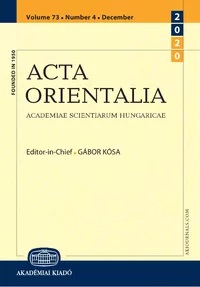The Interpretation and Reconstruction of the Process of the Japanization of Confucianism: A Case Study on the Kyoto Faction of Zhu Xi Studies in Tokugawa Japan
The Interpretation and Reconstruction of the Process of the Japanization of Confucianism: A Case Study on the Kyoto Faction of Zhu Xi Studies in Tokugawa Japan
Author(s): Ying LiuSubject(s): East Asian Philosophy
Published by: Akadémiai Kiadó
Keywords: Japanization of Confucianism; Kyoto faction; Zhu Xi studies; Japanese Confucianism
Summary/Abstract: The concept of the ‘Japanization of Confucianism’ took shape during the Meiji 明治 period (1868–1912 C.E.), reached its highest point of development in Tokugawa Japan (1603–1868), and is epitomized by the rise of the Kyoto faction (Kyō-gakuha 京學派) of Zhu Xi studies (Shushi-gaku 朱子學). However, due to the underestimation of Japanese Zhu Xi studies by scholars like Inoue Tetsujirō 井上哲次郎 from the early twentieth century onward, the Kyoto faction ipso facto has been largely eclipsed in the history of the study of Japanese Confucianism. In light of this, the present article investigates the representative scholars in the Kyoto faction to uncover the dynamic process of Confucianism’s penetration into Japanese society. A multiple-dimension study is conducted to dissect varied approaches to promoting the Japanization of Confucianism, including the vernacularization and sanctification of Confucianism in Japan. This article seeks to redefine the role of the Kyoto faction in the transmission of Confucianism across East Asia.
Journal: Acta Orientalia Academiae Scientiarum Hungaricae
- Issue Year: 76/2023
- Issue No: 2
- Page Range: 193-220
- Page Count: 28
- Language: English
- Content File-PDF

